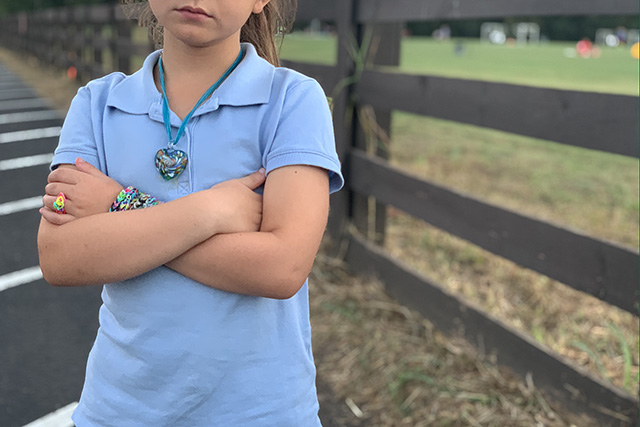3 Ways to Approach the Problems Kids Face

It can be difficult to see your children face a difficult situation. These ideas will help empower you to navigate their feelings and the challenge. This post is sponsored by Responsibility.org.
My eight-year-old daughter Adeline loves to give gifts. One day after school, she came home with clay animals that she had created in her after school program. She had made a clay cat for her neighborhood friend and went right over to her house to give it to her. She was so excited about it.
The next day, Adeline and her friend were playing. It had been a long day at school and Adeline decided she wanted to go in early and rest. This frustrated her friend and she gave Adeline the cat back. Adeline came in the house, went to her bedroom and cried.
Matthew and I were making dinner and Adeline told us later what happened.
We encouraged her the next day to talk with her friend about her feelings, why she had wanted to go inside (that it had nothing to do with her friend and everything to do with listening to her body), and that it was hurtful when she gave her the cat back. It was important to me that we discuss how to solve the problem and talk through it with her friend. Sure, there was a part of me that wanted to fix the problem—because I’m a natural-born fixer—but for some reason, I felt like I needed to wait and see what might transpire.
The next day she went to her friend’s house and before she could say anything, her friend apologized. They were able to have a kind conversation and were back to being besties.
While most problems that children face are fairly simple, sometimes our kids do encounter challenges that are much more difficult to navigate. But one thing that I am learning to do is, as often as I can, use the small problems that my kids experience to hopefully help them learn habits, skills, and healthy ways in which to solve problems on their own.
As you might remember, I’ve been partnering with Responsibility.org this year. I’ve really enjoyed this relationship with them because it has really offered me some good parenting reminders for what I need to be proactively teaching my kids. While responsibility.org is a non-profit that focuses on helping parents engage their kids on the topic of alcohol, the advice they encourage is really about more than that—it’s about helping parents raise happy humans who know how to make good choices, who surround themselves with positive influences, and who knows how to navigate the challenges of peer pressure.
During last year’s Responsibility summit in Washington DC, one of the presenters was Phyllis Fagell, an author and journalist who writes books and articles about parenting middle schoolers and teens. As a licensed school counselor, Fagell’s wisdom is not simply words, but built upon the stories, interactions, and challenges she engages every day.
At the summit, she challenged parents to consider how they engage problem-solving with their children, wanting us to explore the line that exists between listening to our children’s stories or challenges and being tempted to try and fix whatever issues arise in our children’s lives.
To this end, she asked us to consider a few questions/ideas to help us rethink our approaches to the “problems” our kids face.
1) Are your kids identifying something as a problem or are you thinking it’s a problem? She said that, oftentimes, rather than inviting their children to tell them about their day at school, parents will mine their children’s stories for problems or troubling details and hone in on that “triggering” information. “Don’t interview for pain,” said Fagell, “be present for everything that your child is sharing [but] don’t mine for misery and [don’t] interrogate.”
2) What is the outcome your child wants? When your child says he/she has a problem, rather than focusing on all of the negative parts of the problem, ask them what kind of outcome they desire. “Get them to talk about the steps they think could be taken in order to solve this problem,” she advised.
3) Consider the uncertainty your child might be feeling. More than the reality of their problems, Fagell says that what creates stress most often in children’s lives is uncertainty. She believes that the better path for parents to take rather than fixing things is to offer kids a sense of empowerment to control what is in their ability to control, helping them walk through the steps it takes to remedy their problem. “Ask your kids questions like this,” says Fagell, “what have you tried? What are you going to try next? Give them the sense of agency that they can solve their own problems!”
Such good stuff, right? I hope that this is as helpful to you as it was to Matthew and me as we begin to navigate more challenging situations that our kids face. For more conversation starters and resources to help on your parenting journey, visit Responsibility.org. Also check out this video from the summit.
